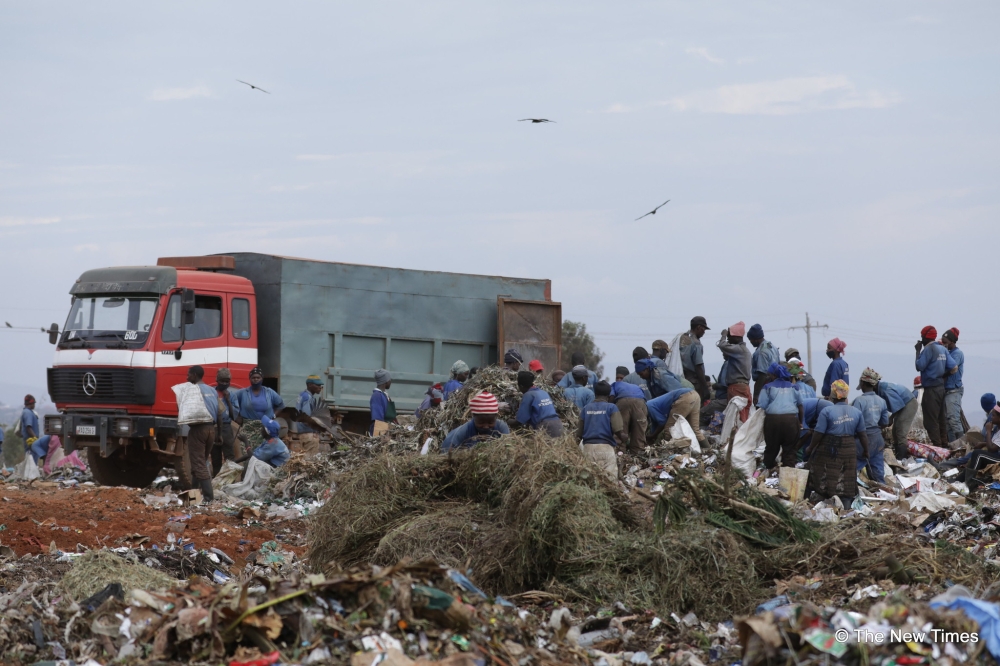

The government is planning to set up a modern waste management facility in Nduba Sector, Gasabo District, Kigali, at a tune of €67 million (approx. Rwf93 billion) in an effort to address health hazards occasioned by poor techniques used in refuse handling at the current landfill in the area.
Dominique Murekezi, the Acting Managing Director at WASAC Development Ltd, told The New Times that the project execution will take two years to be completed in 2026, pointing out a feasibility study of the project was finalised in 2022.
"We have not yet gotten a financier, we are currently mobilising funds for the project,” he said, adding that implementation will start as soon as finance gets available.
ALSO READ: Officials say proposed landfill at Nduba will help address public health concerns
The facility, which will be near the existing Nduba Landfill, will cover more than 50 hectares of land, with a fence, and will not be an open dumpsite, Murekezi observed, indicating that the land on which it will be set up is already available.
"It is to ensure that when waste comes from households or other generation sources, they get treated so that it does not become a problem, does not continue to cause foul order, or generate contaminated liquid that is harmful to the environment,” he said of the implication of the facility.
Existing challenges regarding the current landfill, include that waste dumped there is mixed – with decomposable or organic refuse, and non-organic one being unsorted – which increases the cost of sorting them or handling them.
Also, leachate – liquid that is generated from waste – is a public concern. Such a foul-smelling liquid can infiltrate the soil and contaminate underground water, or negatively affect vegetation growth in an area in question.
Infrastructure and buildings for waste management
Under the facility, Murekezi said, the main activities will be infrastructure and buildings for waste reception and handling, machinery and equipment for waste handling and sorting, administration buildings for employees, cells to receive waste with no resource recoverability (such as old clothes that cannot be used to create new valuable products through recycling), and a leachate treatment plant.
He indicated that treated leachate can be brought back to nature as it is no longer harmful.
Also, he said, there will be roads and lighting within the facility area, and a place designed for cleaning trucks that will be taking waste there so that they do not take waste back into the community.


Currently, he said Nduba Landfill receives about 600 tonnes of waste per day from different parts of Kigali, on average, pointing out that dumping that amount of waste and burying it implies a cost.
The infrastructures at the facility, he pointed out, will be used for proper waste handling so that it can be utilised.
Meanwhile, Murekezi said that waste management is not a lucrative business, pointing out that waste management policy is meant to prevent hazards that it would cause, "and that’s why it is a public liability.”
However, he indicated that waste management can be done by minimising cost, which can be achieved through turning it into useful products such as fertiliser from organic waste.
He said that through effective sorting, plastic waste can be taken to people who make plastic products so that they can make use to make new products, while old metals can be supplied to people who produce iron bars or metallic products for recycling.
On what will happen to the current landfill, he said that it will be closed, and get covered with a garden, while methane gas from the decaying organic waste could be extracted from it for use.
On April 29, members of the Parliament’s Public Accounts Committee (PAC) expressed concern over the Nduba Landfill, including the health hazards it poses to communities living in its vicinity, and inability to turn waste into fertilisers as planned.
PAC indicated that expropriation of the residents was also lacking, indicating that an inspection by the Auditor General showed that residents in 394 inhabited plots were not relocated, yet they were within 400 meters from the landfill, which should be an uninhabited zone.
Murekezi told PAC members that taking unsorted waste to Nduba Landfill was a hindrance to efforts to turn organic waste into fertiliser needed to improve crop yields.
This is the case because it makes it difficult to sort huge heaps of waste at the site, some of which is unfit for safe organic fertiliser production, he indicated.
He indicated that relocation of the affected residents was an ongoing process.


